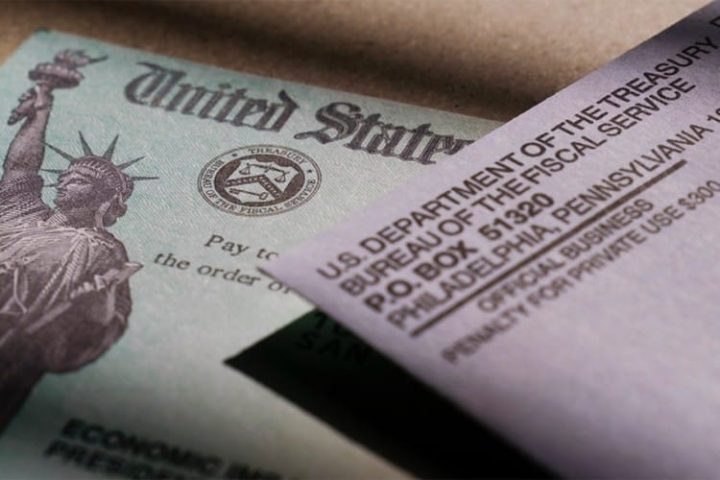
COVID-19 stimulus checks contributed “significantly” to the increases in deaths caused by opioid overdoses across the country, according to a new study that has been peer-reviewed and accepted for publication by the International Journal of Drug Policy in April 2022.
The study entitled “COVID-19 economic impact payments and opioid overdose deaths” was released by Ohio Attorney General Dave Yost on Thursday.
“The link between pandemic relief money and opioid overdose deaths is now evident,” Yost said in a press release, “The intent was to help Americans navigate this deadly pandemic but it also fueled a tidal wave of overdoses.”
The researchers’ team led by Dr. Jon Sprague, Director of Science and Research for the Ohio Attorney General’s Office and the Bureau of Criminal Investigation Eminent Scholar at Bowling Green State University used data from the Ohio Department of Health. They found that spikes in opioid-related overdose deaths in Ohio and elsewhere in the country during the second quarter of 2020 always coincided with delivery of federal stimulus checks.
Per the text of the study,
“The convergence of the COVID-19 (SARS-CoV-2) pandemic with the opioid epidemic has created a “perfect storm” which has resulted in the historically high levels of drug overdose deaths that have now surpassed 100,000 in a 12 month period in the United States (Centers for Disease Control and Prevention [CDC], 2021). Policy responses to the pandemic have inadvertently resulted in contributing to the exacerbation of the epidemic.”
This is the biggest ever-recorded number in a 12-month period since the agency began publicly tracking opioid deaths in 1999.
The study continues by stating that compared to the general population, opioid users have been much more susceptible to COVID-related stressors such as social isolation, loss of income/ housing, reduced availability of harm reduction strategies and decreased access to medication treatment for opioid use disorder.
Adding insult to injury, the clandestinely produced novel fentanyl-related compounds of unknown and dangerous pharmacological and toxicological effects have been proliferating on the drug market. Use of these highly toxic synthetic opioids played a major role in the overdose rates, said the researchers.
The most disturbing fact, however, was that the government payments have been associated with the rapid drug intake and the consequent overdoses among the economically vulnerable Americans. The researchers call this connection a “check effect:”
“The link between the timing of assistance payments and drug overdose deaths reflects a phenomenon known as the “check effect”. The check effect has been associated with higher numbers of drug overdose deaths, hospital admissions and 911 calls in the days and weeks associated with income assistance payments.”
The researchers underline that while the government’s intent was arguably aimed at supporting people by providing for their basic needs, the payments have “actually facilitate[d] a cyclic pattern of substance use and increased overdose deaths,” particularly among “middle aged, white, men.”
Basically, stressed-out, isolated, unemployed drug users did not go to the grocery store to get food with their COVID checks. They went on the street to buy drugs.
“Throwing money at a problem isn’t always the best solution,” Yost concluded. “Let the data be the guide to learn from the past. Addiction is a sickness you can’t cure with just cash.”
On March 27 2020, President Donald Trump signed a $2 trillion-U.S. stimulus package, aka Coronavirus Aid, Relief, and Economic Security Act (CARES). This was the largest emergency relief bill in American history and included one-time cash payments of up to $1,200 to Americans who qualify.
On December 27 2020, the Congress passed a $2.3 trillion spending bill “The Consolidated Appropriations Act” that combined $900 billion in stimulus relief for the COVID-19 pandemic with a $1.4 trillion omnibus spending bill for the 2021 federal fiscal year.
Finally, on March 10, 2021, President Biden signed a $1.9 trillion “The American Rescue Plan,” aka the COVID-19 Stimulus Package which provided for the third round of payment worth $1,400 each to American adults and their dependents.
The Biden Administration and Opioid Crisis
The Biden administration claims it is committed to addressing the nation’s addiction crisis. It specifically earmarked $4 billion in the so-called American Rescue Plan for expanding treatment access and increasing availability of naloxone—an antidote to opioid overdose—nationwide. Biden’s “Build Back Better” framework includes $11 billion in additional funding to address drug trafficking and to address “inequities in treatment.”
It is unclear how fruitful these programs would be since the administration has no plans of securing the United States’ southern border, which remains the main avenue for the drug trafficking.
According to the Drug Enforcement Administration’s (DEA) recent report, Mexican cartels are “the greatest drug trafficking threat to the United States.” The cartels “control most of the U.S. drug market and have established varied transportation routes, have advanced communications capabilities, and hold strong affiliations with criminal groups and gangs in the United States,” per the administration.
The report specifically underlines that illicit fentanyl that poisons Americans is “produced in foreign clandestine laboratories and trafficked into the United States” and “is primarily responsible for fueling the ongoing opioid crisis.”
DEA also notes that many of the illicit drugs trafficked from the south, especially fentanyl, originate in China. The latter rarely sends fentanyl directly to America, and opts instead to utilize Mexican cartels and a wide-open southern border. The cartels are producing the drug as well. For that, they use chemicals which they yet again obtain from China.
Instead of taking action to fight this plague, House Democrats this month blocked the HALT Fentanyl Act, a bill that would make the emergency class-wide scheduling order for fentanyl-related substances permanent. Right now, that order is set to expire today, on February 18. That means that it will nowqbe harder for the law enforcement agencies to prosecute fentanyl traffickers.




